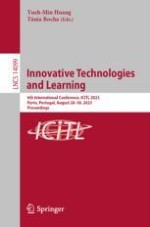2023 | OriginalPaper | Buchkapitel
Exploring the Learning Efficacy of Students’ STEM Education from the Process of Hands-On Practical Experience
verfasst von : King-Dow Su, Hsih-Yueh Chen
Erschienen in: Innovative Technologies and Learning
Verlag: Springer Nature Switzerland
Aktivieren Sie unsere intelligente Suche, um passende Fachinhalte oder Patente zu finden.
Wählen Sie Textabschnitte aus um mit Künstlicher Intelligenz passenden Patente zu finden. powered by
Markieren Sie Textabschnitte, um KI-gestützt weitere passende Inhalte zu finden. powered by
